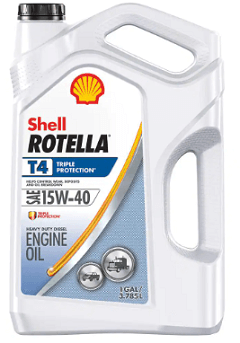No, you cannot use 15W40 diesel oil in a gas engine. It is not compatible and can cause damage to the engine.
When it comes to using oil in an engine, it is essential to choose the right type to ensure optimal performance and longevity. Using the wrong oil can lead to issues such as poor lubrication, increased wear and tear, and potential engine damage.
While 15W40 diesel oil is suitable for diesel engines, it is not designed for use in gas engines. Gas engines require a different type of oil that meets the specific requirements for gasoline combustion.
Using diesel oil in a gas engine can result in inadequate lubrication and potential damage to engine components. Therefore, it is crucial to use the appropriate oil recommended by the manufacturer to ensure the smooth and efficient operation of your gas engine.
Understanding The Differences Between Diesel And Gas Engines
Diesel and gas engines have significant differences in their mechanics, particularly in fuel ignition and compression ratios. In diesel engines, the fuel ignites through compression alone, while in gas engines, it ignites through the use of spark plugs.
This difference in ignition leads to varying compression ratios. Diesel engines have higher compression ratios due to the nature of their combustion process, which results in higher torque and power output.
Gas engines, on the other hand, have lower compression ratios and rely on a mixture of air and fuel as well as spark plugs to ignite the fuel. It’s important to use the appropriate oil for each type of engine to ensure optimal performance and avoid potential damage.
So, when considering whether you can use 15W40 diesel oil in a gas engine, it’s essential to understand the distinctions between these two engine types.

The Composition And Purpose Of 15w40 Diesel Oil
The composition and purpose of 15W40 diesel oil plays a crucial role in engine performance. This type of oil is specifically designed for diesel engines, known for their higher compression ratios and operating temperatures. The main purpose of 15W40 diesel oil is to reduce friction between engine parts, prevent wear and tear, and extend the engine’s lifespan.
Exploring the specific properties of 15W40 diesel oil, it is important to understand that the two numbers in the oil’s name represent its viscosity rating.
The number before the “W” indicates the oil’s viscosity during winter conditions, while the number after the “W” represents its viscosity at operating temperature. This allows the oil to provide adequate lubrication in extreme temperature variations.
Furthermore, 15W40 diesel oil contains additives that enhance its performance, such as detergents to keep the engine clean, anti-foaming agents to prevent air bubbles in the oil, and anti-wear agents to protect engine parts. The high viscosity of 15W40 oil ensures optimal lubrication of the engine’s components, even under heavy loads or high temperatures.
In summary, 15W40 diesel oil offers excellent lubrication properties suitable for diesel engines. However, it is not recommended for use in gas engines, as they require oils with different viscosities and additives tailored to their specific needs.
Potential Risks And Consequences Of Using 15w40 Diesel Oil In A Gas Engine
Diesel oil is specifically formulated to meet the needs of diesel engines, which operate at higher temperatures and pressures compared to gas engines. Consequently, using 15W40 diesel oil in a gas engine can have adverse effects.
One potential risk is increased engine wear and tear due to the viscosity difference between the two types of oil. Diesel oil is thicker and less volatile, which may impede lubrication in gas engine components.
This can lead to increased friction, heat, and overall engine stress. Moreover, the use of diesel oil in a gas engine can negatively impact fuel efficiency and emissions. Gas engines require lighter oils that can flow easily, whereas diesel oil may not achieve proper combustion in a gas engine, leading to reduced efficiency and increased pollution.
The long-term use of diesel oil in a gas engine can also cause damage to engine components and affect overall performance. It is always recommended to use oil specifically designed for gas engines to ensure optimal performance and avoid potential consequences.
Myth: “both Diesel And Gas Oil Are The Same”
There is a common myth that diesel oil and gas oil are the same and can be used interchangeably. However, this is not true. The composition and additives of these oils are different, making them unsuitable for each other’s engines.
Diesel oil, such as 15W40, is formulated specifically for diesel engines. It has a higher viscosity to withstand the high temperatures and pressures in diesel engines. meaning fewer oil changes are requiredat help control soot, oxidation, and wear in diesel engines.
On the other hand, gas oil, also known as gasoline oil, is formulated for gasoline engines. It has a lower viscosity to ensure proper lubrication in these engines. Gas oil also contains additives that control deposits, corrosion, and wear in gasoline engines.
Using 15W40 diesel oil in a gas engine can lead to engine damage and reduced performance. It may not provide adequate lubrication and protection, resulting in increased friction and wear. It is essential to use the recommended oil type for your specific engine to ensure optimal performance and longevity.
Myth: “using Diesel Oil In A Gas Engine Provides Better Lubrication”
Using the right type of engine oil is essential for optimal performance and longevity of your vehicle. While it may be tempting to use 15W40 diesel oil in a gas engine, it is not recommended. The myth that diesel oil provides better lubrication for gas engines is simply untrue.
Using diesel oil in a gas engine can have detrimental effects on its performance. Diesel oil is formulated differently than gas engine oil, with different additives and viscosity levels. Gas engines require specific oils that are designed to meet their unique needs, such as providing enhanced protection against wear, reducing engine deposits, and improving fuel economy.
Using the wrong oil can lead to inadequate lubrication, decreased engine efficiency, and potentially costly damage. It is important to always refer to your vehicle’s owner’s manual for the recommended oil viscosity and specifications. Using the recommended oil will ensure that your gas engine functions properly and remains protected against wear and tear.
Myth: “you Can Safely Use 15w40 Diesel Oil In A Gas Engine”
Myth: “You can safely use 15W40 diesel oil in a gas engine”
Exploring the compatibility issues between diesel oil and gas engines:
| Manufacturer Recommendations | Warranty Implications |
| Diesel oil is formulated specifically for diesel engines, which have different requirements than gas engines. | If you use diesel oil in a gas engine, it may nullify the manufacturer’s warranty. |
| Gasoline engines require lubricants that meet specific API (American Petroleum Institute) ratings, such as SN or SM. | Using the wrong oil in a gas engine can result in increased wear and potential engine damage. |
| Diesel oil is typically designed to handle higher operating temperatures and higher levels of soot and contaminants, which gas engines don’t produce in the same quantities. | Using diesel oil in a gas engine can lead to oil thickening, reduced fuel efficiency, and potential engine performance issues. |
| It’s essential to check the owner’s manual for the recommended oil viscosity and specifications for your gas engine. | Using the recommended oil ensures optimal engine performance and protects your warranty. |
Understanding The Importance Of Oil Viscosity For Gas Engines
Vehicles rely on oil to provide lubrication and prevent engine damage. Understanding the importance of oil viscosity is crucial, especially when it comes to gas engines. Viscosity refers to the oil’s resistance to flow at different temperatures. Gas engines require oils with specific viscosity levels to ensure optimal performance and protection.
Explaining the role of viscosity in engine lubrication: Viscosity plays a vital role in lubricating the engine components. The oil acts as a protective barrier between the moving parts, reducing friction and wear. Different engine designs and operating conditions require oils with varying viscosities to maintain proper lubrication.
| Viscosity Grade | Low-Temperature Performance | High-Temperature Performance |
|---|---|---|
| 5W-30 | Good | Good |
| 10W-30 | Fair | Good |
| 15W-40 | Poor | Excellent |
As depicted in the table, the recommended oil viscosity changes based on climate conditions. Lower viscosity grades (e.g., 5W-30) perform well in colder temperatures, while higher viscosity grades (e.g., 15W-40) provide better protection in hotter conditions. It is essential to choose the correct viscosity to ensure proper lubrication and avoid potential engine damage.
Note: It is important to consult your vehicle’s manufacturer or refer to the owner’s manual for the recommended oil viscosity for your specific gas engine.
Recommended Oils For Gas Engines: Synthetic And Conventional
| Recommended Oils for Gas Engines: Synthetic and Conventional |
|---|
Choosing the right oil for your gas engine is essential to ensure its optimal performance and longevity. When it comes to selecting an oil, it is important to understand the benefits and drawbacks of both synthetic and conventional oils.
Synthetic Oils: Synthetic oils are known for their superior lubricating properties, which can help reduce friction and engine wear. They also offer improved viscosity at extreme temperatures, making them suitable for use in both hot and cold climates. Additionally, synthetic oils have a longer lifespan compared to conventional oils, meaning fewer oil changes are required.
However, one drawback of synthetic oils is their higher price point, which can make them less affordable for some car owners. It is also worth noting that older engines may not benefit as much from synthetic oils compared to newer ones.
Conventional Oils: Conventional oils, on the other hand, are typically more budget-friendly and widely available. While they may not offer the same level of performance and longevity as synthetic oils, they still provide adequate lubrication for most gas engines.
Overall, when considering the use of 15W40 diesel oil in a gas engine, it is generally not recommended. It is best to stick to oils specifically formulated for gas engines to ensure optimal performance and avoid potential issues. Always refer to your vehicle’s owner manual for the recommended oil type and viscosity.
Factors To Consider When Selecting The Right Oil For Your Gas Engine
When selecting the right oil for your gas engine, there are several factors to consider. First and foremost is the age of your engine. Older engines may require a different viscosity oil compared to newer engines.
Next, the mileage of your vehicle plays a role in determining the best oil for your engine. Higher mileage engines may benefit from using a thicker oil to help reduce oil consumption and prevent excessive wear. Lastly, it’s important to take into consideration any specific requirements set by your vehicle manufacturer.
To ensure quality and performance, look for oils that carry the API (American Petroleum Institute) certification. This certification indicates that the oil has met or exceeded the industry standards set by the API.
Pay attention to the API classification, as different letters indicate different performance levels. For example, an API SN oil is suitable for modern engines.
Frequently Asked Questions For Can You Use 15w40 Diesel Oil In A Gas Engine
Can You Use 15w40 Diesel Oil In A Gas Engine?
No, it is not recommended to use 15W40 diesel oil in a gas engine. Diesel oil has different additives and viscosity requirements than gas engine oil. This can lead to excessive friction and wear, and could potentially damage the engine.
It’s best to use the oil specifically designed for gas engines.
Conclusion
Using 15W40 diesel oil in a gas engine may seem like a convenient solution, but it is not recommended. Diesel oil has different additives and viscosity levels than gasoline engines require, which can lead to engine damage. To ensure optimal performance and long-term durability, it’s best to use the recommended oil type for your specific gas engine.


Leave a Reply